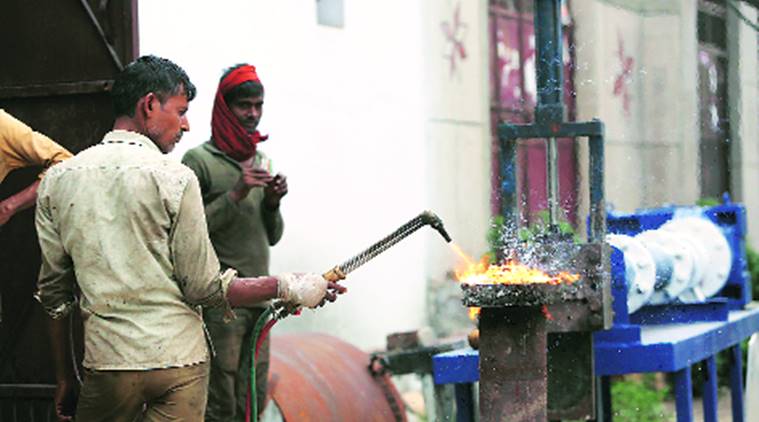 Bawana Industrial Area has around 16,000 small factory units. (Express Photo by Gajendra Yadav)
Bawana Industrial Area has around 16,000 small factory units. (Express Photo by Gajendra Yadav)
Harinder Kumar (18) took his clothes, mobile phone charger and a blanket when he left for his village in UP’s Etawah as the lockdown first came into effect in Delhi. It took him a whole day to reach his village, where he and four family members sustained themselves by growing gehu and dhan on their two bighas of land.
A phone call from his employer at a soft drinks manufacturing unit in Bawana Industrial Area, asking him to come to work, changed that last month. He returned to Delhi, this time in a bus, expecting to see the 40-odd workers back in the unit. Instead, just four had returned.
In a week, the unit shut down and Harinder planned to return to Etawah. “I looked for a job everywhere… I used to earn Rs 8,000 per month. The only job I found was loading corrugated boxes into tempo trucks for Rs 3,000 a month. No one can survive on that,” he said.
Bawana Industrial Area has around 16,000 units making plastic granules, coolers and fans, as well as chemical factories.
Half a month since the unlockdown, the area continues to face an unprecedented challenge of resuscitating units amid a weak demand from wholesale markets and no labour. Industry sources said a large number of fan- and cooler-making units have shut since they missed out on summer months, when they make the revenue for a whole year.
Puneet Bahra from Bawana Factories Welfare Association explained what has changed: “The workers have all left. The ones who stayed back cannot come to Bawana, which is cut off from the rest of Delhi with no last-mile connectivity. Suppliers have started demanding cash; earlier they would give us 15 days to make payments. The whole credit-based system of trade has come to a halt. Employers have to pay fixed costs for four months when the factories did not function. Those workers who remained are demanding high salaries. Naturally, units have started shutting down.”
Outside a cooler-making unit, stacks of blue parts were kept at the entrance. Utpal Pramanik (43), a welder, was busy loading a batch of cooler parts onto a tempo truck. He and a helper, Ramantullah (44), are the only employees at this unit, which earlier employed 20 people. “The summer months were spent in the lockdown. Now, the demand for coolers will decrease with the monsoon. It is better to return than beg in Delhi,” said Utpal.
A shop set in the heart of the industrial area, which mostly sells small machine parts and electrical items to factories nearby, has seen a drastic reduction in sale. Owner Ashok Aggarwal (41) said there is a 30% fall in demand of industrial goods since he opened his shop on May 15. “It is a worrying trend,” he said.
Some workers who used to load and unload material, and transport finished products from factories to wholesale markets, now spend most of their time playing cards beneath the trees.
One of them, Mohammad Ibrahim (28), said he used to earn Rs 300 a day before the lockdown. He has not found work in the last 15 days. “I have nine family members; I have to pay Rs 2,000 as rent along with other daily expenses. Nobody is making anything so we are not needed,” said Ibrahim.
Nearby, three women stood in the middle of the road looking for a rickshaw to take them home. They used to earn Rs 6,000 a month working at a fan-making unit, and received their last salary in March. They had returned to work, but were soon informed that the unit is shutting down.
Israti Khatun (45) said, “I cried in front of him but he said nothing could be done. I have three children to feed. Imagine standing in a line every day for three months for food.”
For Joginder Singh (39) and five other workers, employed in the transport of heavy machinery, there is some work for the first time since the lockdown — carrying heavy iron pipes to a local factory.
Singh, who used to earn Rs 500 to shift a heavy machine part, now does the job for Rs 300: “Before the lockdown, we used to work three days a week. Now, we are lucky to find this assignment. I have two children to feed. I can’t bear to look at them when they ask how my work day was.”